Why you can trust Tom's Hardware
The GP27U defaults to its User 1 mode, so I used that preset for all measurements and calibrations. Though the signals here are SDR, it uses its full gamut, which is much larger than sRGB. I consider the GP27U a Rec.2020 monitor, and I’ll explain why below.
Grayscale and Gamma Tracking
Our grayscale and gamma tests use Calman calibration software from Portrait Displays. We describe our grayscale and gamma tests in detail here.
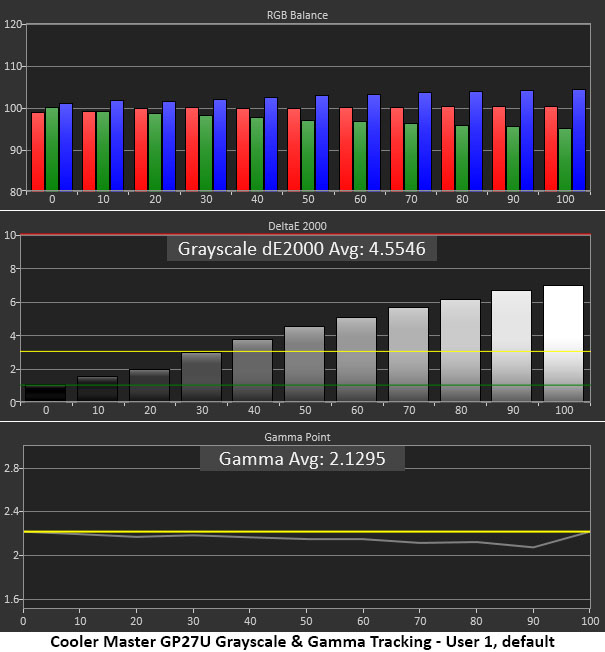
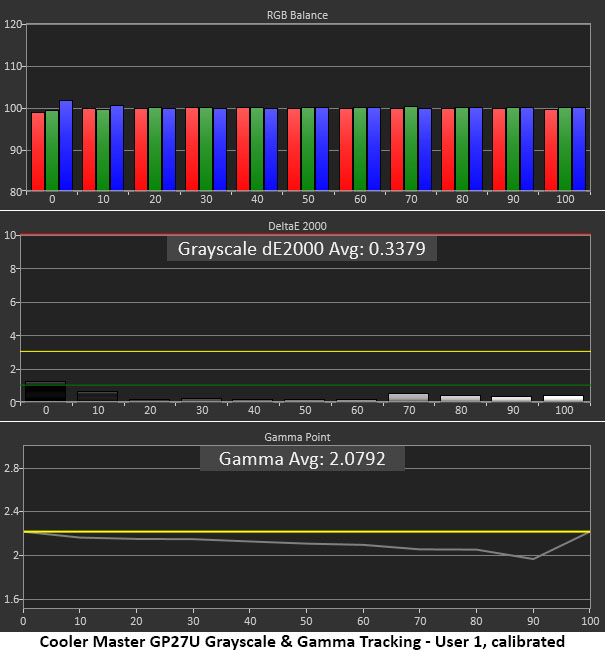
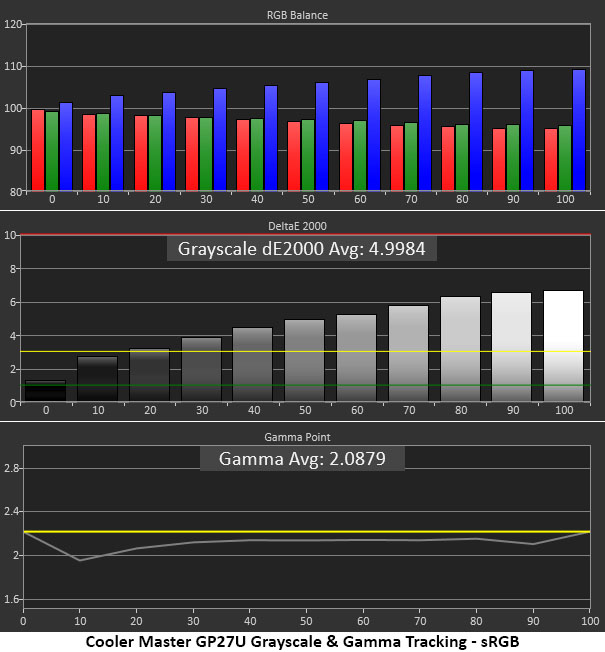
The GP27U’s grayscale tracking is a bit cool by default. I recommend calibration though some users will be satisfied with errors this small. Gamma is a tad light, but this is also a small error.
Calibration results in professional-level grayscale tracking, but gamma is still a little light. It isn’t a big problem, but it could be better, given the excellent results I observed in every other metric. The results above were recorded without local dimming engaged. Turning it on Low enhances contrast and depth significantly.
If you choose sRGB or any other gamut preset from the Color Space menu, the grayscale is cool and cannot be adjusted. Gamma is light here as well. While these additional modes deliver decent gamut accuracy, their grayscale and gamma tracking have room for improvement.
Comparisons
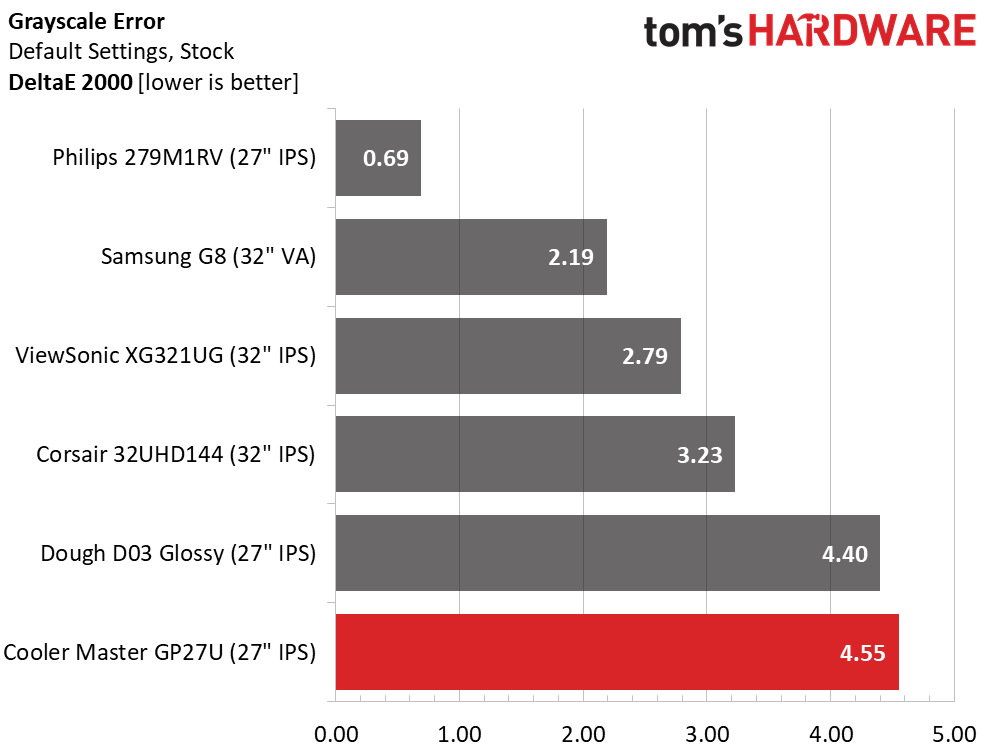
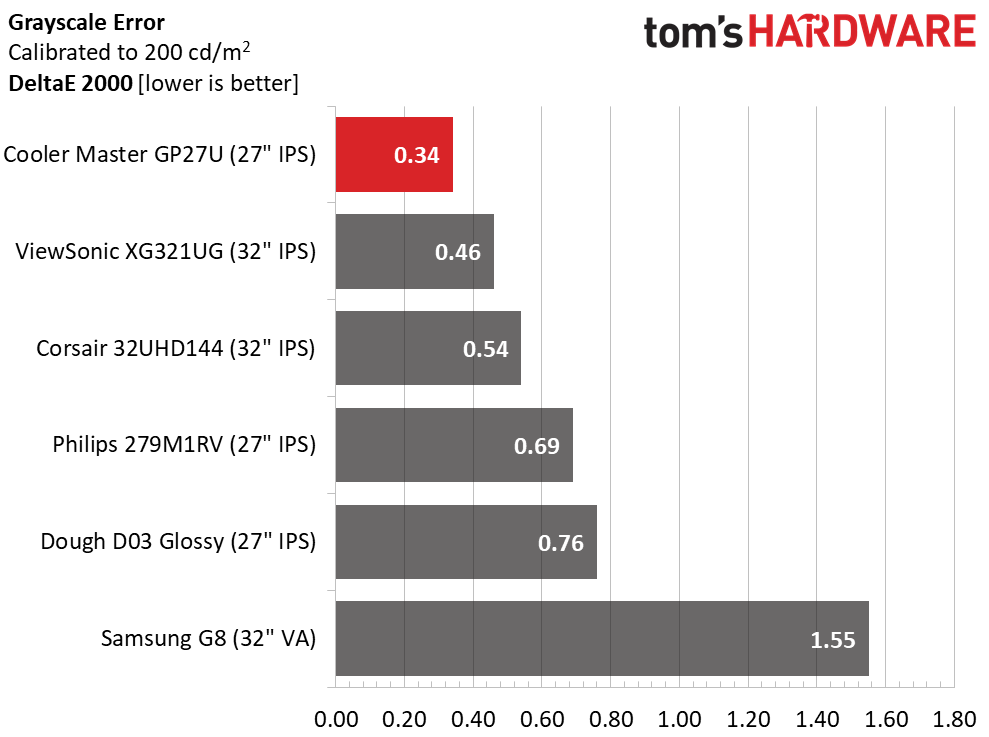
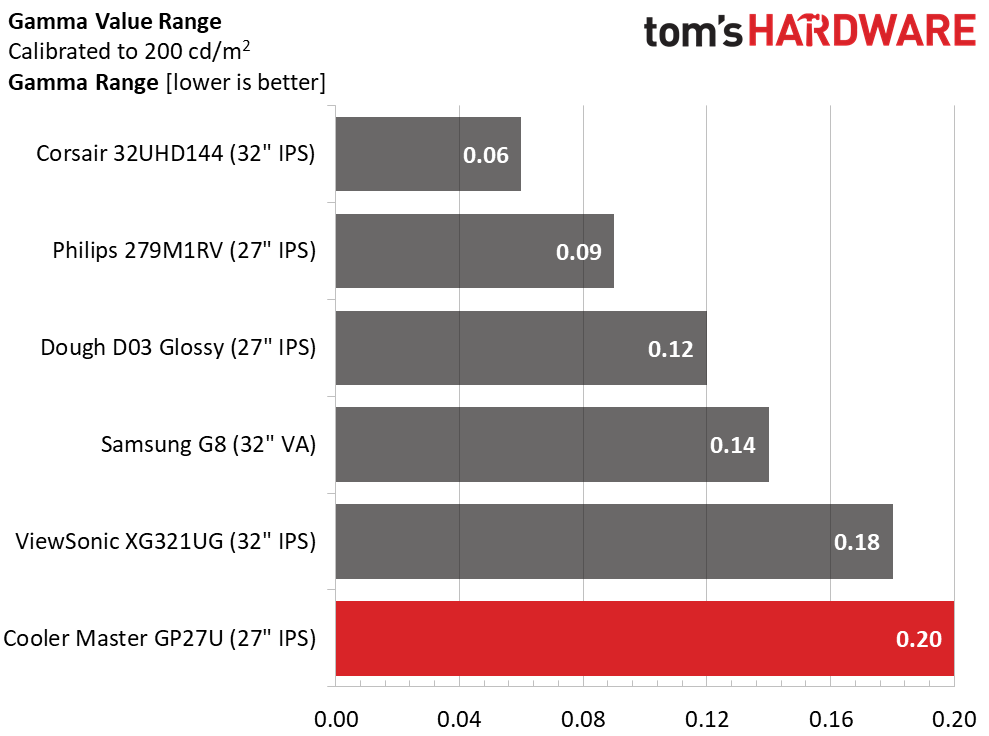
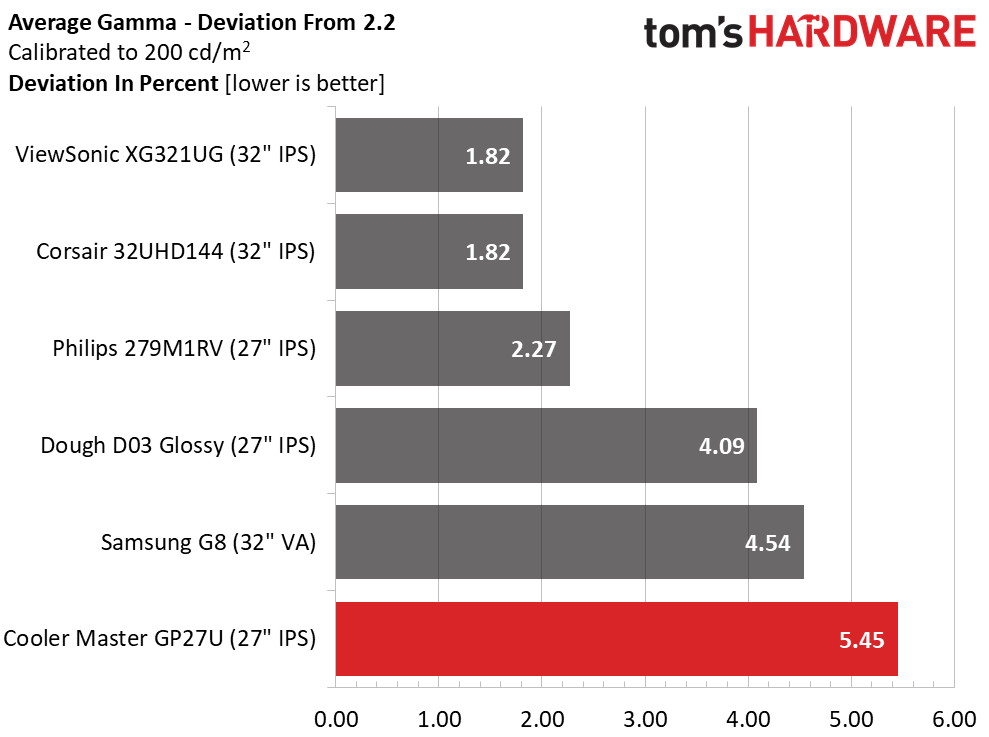
The GP27U’s 4.55dE default grayscale score isn’t bad but compared to the competition, it could be better. Since the error is concentrated in cooler tones, it isn’t too obvious. Calibration puts Cooler Master on top though so it’s well worth making the adjustments.
The gamma comparison is similar. Though the GP27U is in last place, its gamma errors are minor. It’s just that the other monitors are more precise. Once local dimming is engaged, it’s a moot point because the picture will have much deeper blacks and brighter highlights.
Get Tom's Hardware's best news and in-depth reviews, straight to your inbox.
Color Gamut Accuracy
Our color gamut and volume testing use Portrait Displays’ Calman software. For details on our color gamut testing and volume calculations, click here.
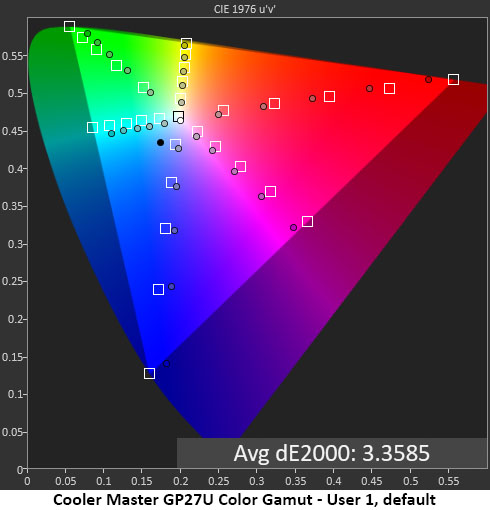
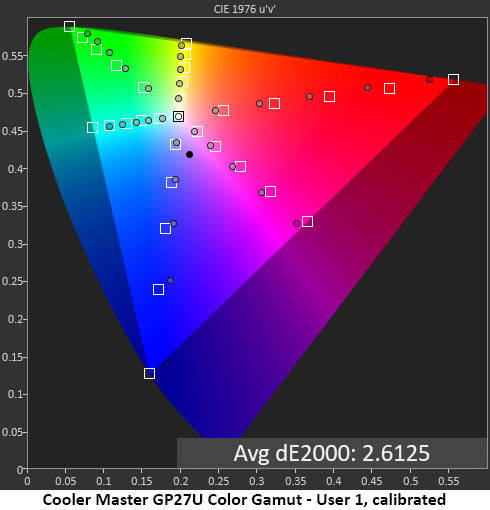
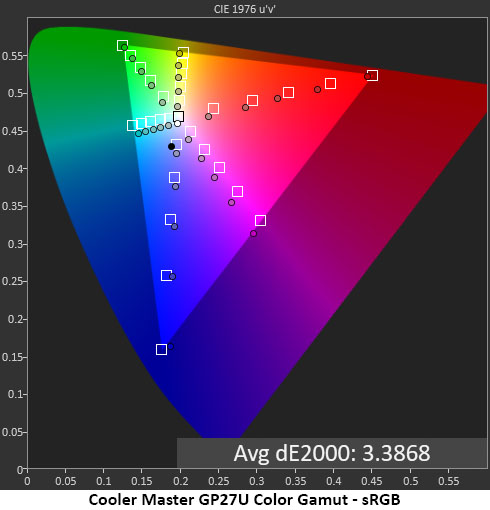
Nearly all wide gamut monitors follow the DCI-P3 standard. But a few try to cover Rec.2020, and that’s what the GP27U is doing. You can identify this by the green hues. Cooler Master is splitting the difference between DCI-P3 and Rec.2020 by moving the green primary further away from yellow. It’s subtle on the chart, but there is a positive impact on the image.
Calibration only makes a tiny difference to color accuracy; it was excellent already. If you think some points are under-saturated, I’ve used Rec.2020 as the reference, not DCI-P3.
The sRGB preset is good but not great. The white point is too blue, which pulls cyan and magenta off hue. Red is also under-saturated. This is very good performance, but given how good the GP27U is at rendering its native gamut, I’m reasonable in wishing for better.
Comparisons
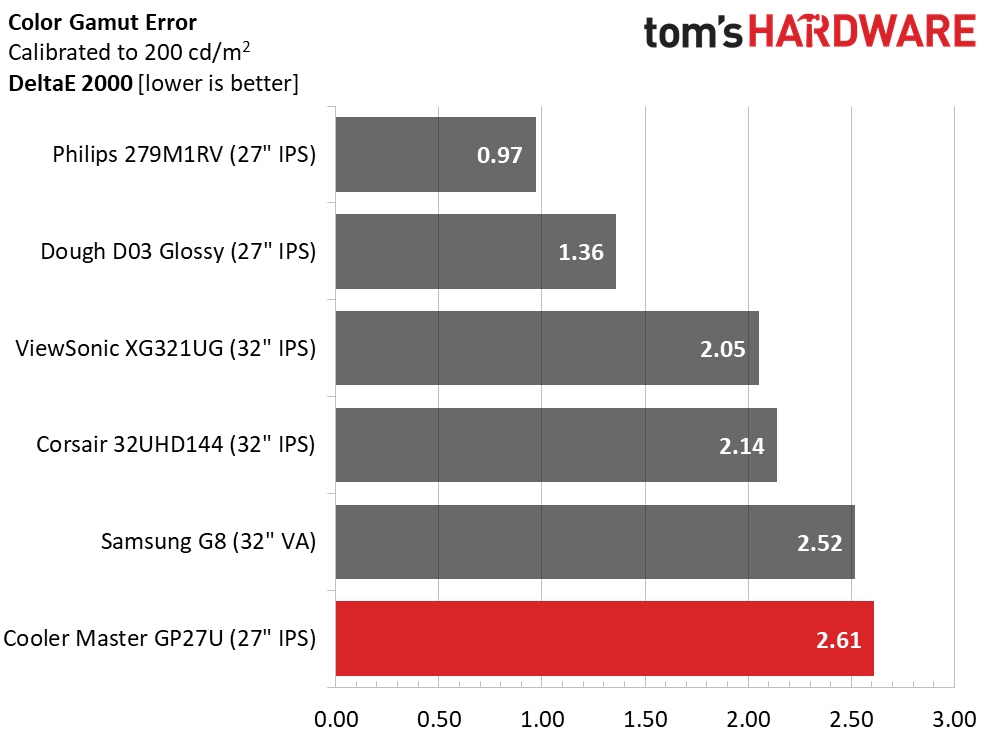
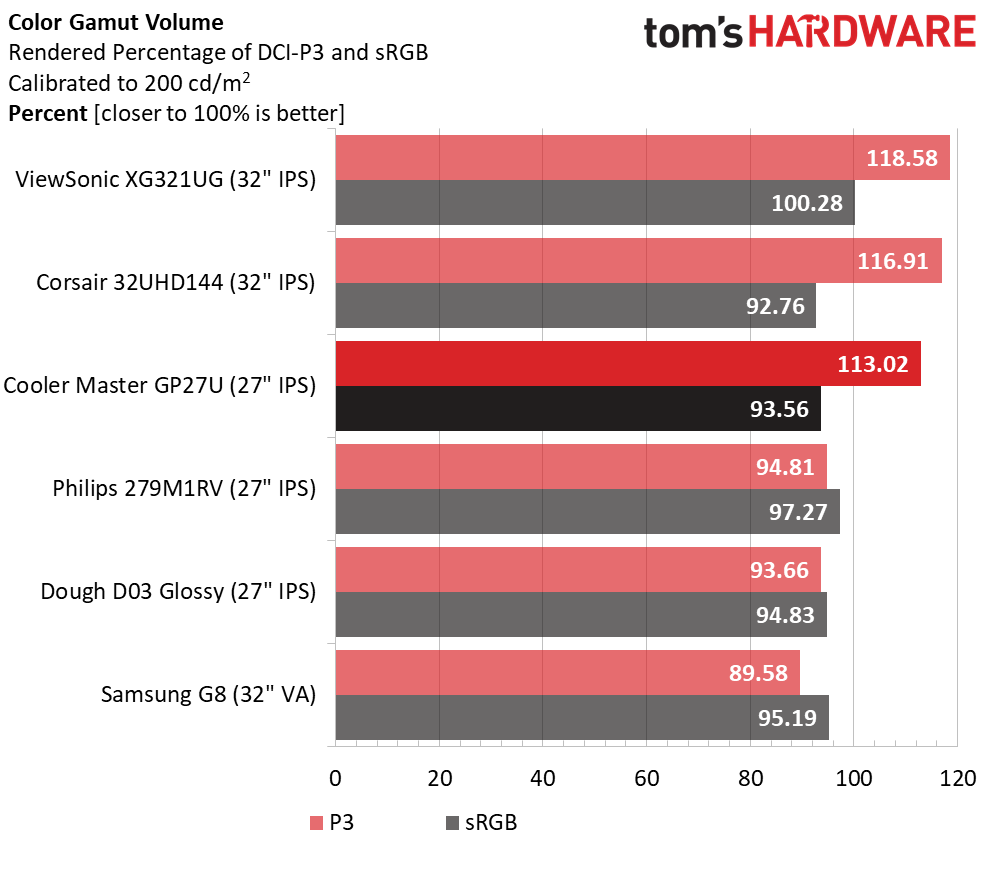
The GP27U is up against the strong competition when a 2.61dE color score comes in last place. None of the monitors have any visible color errors. However, the Cooler Master has more color volume than most. Surprisingly, it isn’t the top finisher in that test, but visually, it’ll be hard to see a difference between the top three. I recommend a software profile for any color-critical work, even when using the GP27U’s additional color space presets.
MORE: Best Gaming Monitors
MORE: How We Test PC Monitors
MORE: How to Buy a PC Monitor: A 2022 Guide
MORE: How to Choose the Best HDR Monitor
Current page: Grayscale, Gamma and Color
Prev Page Brightness and Contrast Next Page HDR Performance
Christian Eberle is a Contributing Editor for Tom's Hardware US. He's a veteran reviewer of A/V equipment, specializing in monitors. Christian began his obsession with tech when he built his first PC in 1991, a 286 running DOS 3.0 at a blazing 12MHz. In 2006, he undertook training from the Imaging Science Foundation in video calibration and testing and thus started a passion for precise imaging that persists to this day. He is also a professional musician with a degree from the New England Conservatory as a classical bassoonist which he used to good effect as a performer with the West Point Army Band from 1987 to 2013. He enjoys watching movies and listening to high-end audio in his custom-built home theater and can be seen riding trails near his home on a race-ready ICE VTX recumbent trike. Christian enjoys the endless summer in Florida where he lives with his wife and Chihuahua and plays with orchestras around the state.
-
healthy Pro-teen Reply
it depends on the resolution you want, for example, the Alienware QD-OLED monitor is 175HZ and not a lot more expensive but it's 1440P instead of 4K. the tempest is the fine value at a thousand dollars.helper800 said:Not OLED and >1000 dollars, no thank you. -
helper800 Reply
You can get a 4k OLED for less than a thousand dollars...healthy Pro-teen said:it depends on the resolution you want, for example, the Alienware QD-OLED monitor is 175HZ and not a lot more expensive but it's 1440P instead of 4K. the tempest is the fine value at a thousand dollars.
Newegg has since changed the link to a different product. The Aorus FO48U monitor. -
PlaneInTheSky ReplyAlienware QD-OLED monitor is 175HZ and not a lot more expensive but it's 1440P instead of 4K
Samsung's QD-OLED (which that Alienware uses) has a lot of artefacts and color fringing issues.
Just search "color fringing qd-oled" and you'll get hundreds of people pointing out the issues with QD-OLED.
OLED has this problem in general, but it is worse on the QD-OLED from samsung.
-
helper800 Reply
When you are viewing content and playing games there are no issues. This issue with QD-OLED is also partially a windows problem because they do not support the pixel layout of the monitor. You can get a 3rd party program that fixes this issue for non-windows ui and text elements within it. You can completely fix this issue for W-OLED with ClearType.PlaneInTheSky said:Samsung's QD-OLED (which that Alienware uses) has a lot of artefacts and color fringing issues.
Just search "color fringing qd-oled" and you'll get hundreds of people pointing out the issues with QD-OLED.
OLED has this problem in general, but it is worse on the QD-OLED from samsung.
-
PlaneInTheSky ReplyWhen you are viewing content and playing games there are no issues.
In every game with text, the color fringing of QD-OLED and OLED, IS a major issue.
Monitor makers are trying to damage control this issue, but when people are paying so much money for an OLED monitor and they realize OLED tech has color fringing issues that even $100 VA or IPS panels don't have, that leaves a very sour taste in people's mouth.
The color fringing is also an issue with high contrast UI elements.
-
helper800 Reply
I am literally staring at this on my W-OLED tv 44 inches from my eyes and cannot distinguish any fringing. My brother's QD-OLED has some fringing at appropriate viewing distances but, like I said, there are 3rd party text clarity programs that can fix the issue in some circumstances.PlaneInTheSky said:In every game with text, the color fringing of QD-OLED and OLED, IS a major issue.
Monitor makers are trying to damage control this issue, but when people are paying so much money for an OLED monitor and they realize OLED tech has color fringing issues that even $100 VA or IPS panels don't have, that leaves a very sour taste in people's mouth.
The color fringing is also an issue with high contrast UI elements.
52eiLP3Zy-sView: https://www.youtube.com/watch?app=desktop&v=52eiLP3Zy-s -
Lug "The only caveat is that you must turn off Adaptive-Sync to go above 144 Hz "Reply
Not with firmware update from December 2022.. :
Changelog:
Adaptive Sync (VRR) and Local Dimming can now be enabled together.Fixed some instances where the KVM would not automatically switch to a new signal input.
More overall flexible color adjustments in all picture modes.
Enabling Adaptive Sync will no longer limit the refresh rate to 144Hz, and instead works up to 160Hz (both HDMI 2.1 and DP). -
healthy Pro-teen Reply
That AORUS FO48U could be a legit alternative, but The tempest has Brighter, better HDR, and a higher refresh rate. I'll consider it If it ever comes back into stock.helper800 said:You can get a 4k OLED for less than a thousand dollars...